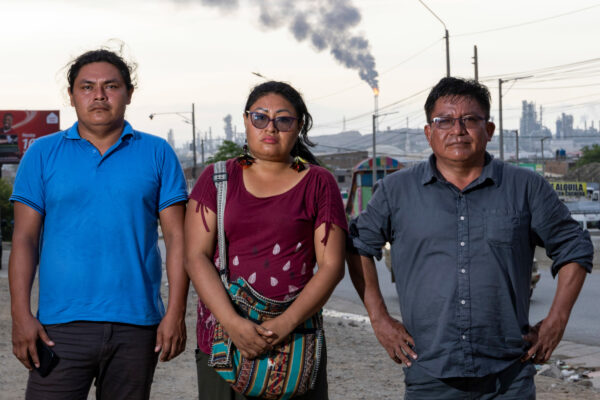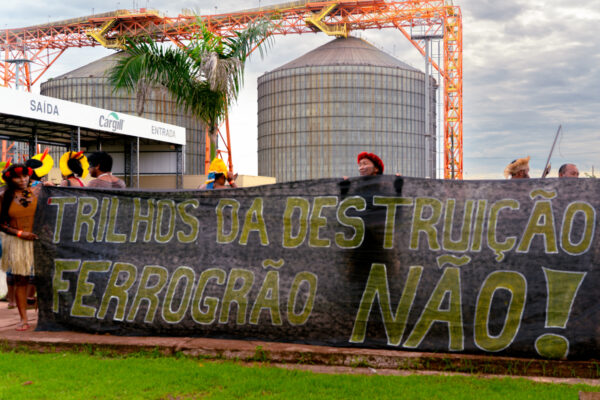Bogota – The U’wa Indians of northeastern Colombia say the government will have to kill every last member of their tribe before they allow California-based Occidental Petroleum Corp. to pump oil from their ancestral lands.
The vow marks the latest in an eight-year battle between the U’wa and the multinational oil giant. Initially the tribe threatened to commit mass suicide by jumping off a 1,400-foot cliff. Later, the tribe pondered mass exile.
“There is nothing to negotiate,” said an U’wa leader, Roberto Cobaria. “The government will have to come and bomb us, then it will be over. Then the government can have all the territory and all the oil,” Mr. Cobaria said in the stark Bogota offices of the National Indigenous Organization.
Since the U’wa fight against Occidental and the Colombian government began in 1992, Mr. Cobaria has shuttled between Colombia’s bustling capital and the cloud forests and lush valleys of his ancestral land near the border with Venezuela.
In the United States, where the U’wa have strong support among environmental groups, the controversy over Occidental’s drilling plans has even tainted Vice President Al Gore’s White House bid.
U.S. supporters of the U’wa cause have pressed Mr. Gore, who controls between $500,000 and $1 million worth of Occidental stock, to divest his shares in the company or to use his influence to change the company’s policies in Colombia. The presumed Democratic Party candidate has largely ignored those pleas.
The U’wa believe that oil is the blood of “Mother Earth,” and that pumping crude is akin to bleeding her dry. Legend holds that the Creator named the U’wa caretakers of the earth, and that if they allow any environmental damage, a huge earthquake will strike.
“That is our No. 1 law. We cannot break that,” said Mr. Cobaria. “If we negotiate, we would be breaking our law.”
In Colombia, the U’wa have used a mix of demonstrations and legal challenges to try to halt Occidental’s drilling plans in the area known to the petroleum world as the Samore Block, believed to hold as much as 2.5 billion barrels of crude.
On the legal front, the U’wa have won small victories, but most rulings in their favor have been overturned by higher courts, and Occidental’s project continues to move forward.
Occidental won the latest court battle in May when the Colombian Superior Court overturned a ruling that temporarily halted all work at the site. The high court found that drilling would not violate the fundamental rights of the U’wa, as the lower judge had ruled.
With every defeat in the courts, the U’wa have taken to the two-lane road that leads from the dusty town of Cubara to the drill site and their reservation, blocking passage of Occidental’s earth movers and other machinery needed to build a road to the drill site.
Three times this year riot police have broken up U’wa roadblocks with batons and tear gas. In February, three children drowned when their mothers tried to flee with them from police action by crossing the swift Cubojon River.
And one man was treated for bullet wounds following the latest clash between police and U’wa protesters June 24-26.
The Colombian government, which granted Occidental the environmental license and drilling rights to sink a $40 million test well, says the nation desperately needs the oil block to avoid becoming a net oil importer by 2004.
Alberto Calderon, president of the state oil company Ecopetrol, has called the Samore Block the most important oil prospect this country has.
While Occidental’s drilling site, known as Gibraltar I, is not directly on the U’wa’s 543,000-acre reservation, it lies just 550 yards from the northeastern edge of the protected territory, and tribal leaders say it is still very much part of their sacred land. And for the U’wa, the importance of the area for their culture means they are willing to die to preserve it.
It was the U’wa’s 1995 threat to commit mass suicide that brought world attention to their plight, and international campaigns in the United States and Europe to help the U’wa fight have made some dents in the process.
Shell Colombia, originally Occidental’s partner in the Samore Block, backed out of the project in 1998 after its corporate offices were flooded with protest letters. But Occidental is standing firm. “Whether it’s Occidental or somebody else that controls this project, it’s going to go forward,” Occidental Vice President Lawrence Meriage told The Washington Times last week.
A spokesman for Occidental’s Colombian unit did not return calls.
The U’wa opposition to the drilling goes beyond protecting their way of life and tribal religious worship.
In Colombia’s brutal internal war between the government and Marxist guerrillas, oil is a target, and the U’wa fear it will bring the country’s 36-year-old conflict to their doorstep.
Already, Colombia’s warring factions are closing in. In March 1999, the Revolutionary Armed Forces of Colombia (FARC), the country’s most powerful rebel group, murdered three U.S. activists who supported the U’wa cause.
The second-largest guerrilla group, the National Liberation Army (ELN), whose campaign against international oil companies is connected with 300 bombings of Occidental’s Cano Limon pipeline, has sided with the U’wa.
Mr. Cobaria said the U’wa have rejected ELN support. But the ELN remains active in the area.
“[The ELN] has set fire to Occidental trucks and machinery, and then the government blames it on us and says we’re working with the guerrillas,” Mr. Cobaria said.
Despite the setbacks, there is no question in Mr. Cobaria’s mind that the U’wa will continue to fight.
“Some people say, ‘the poor U’wa. We have to help them,’ but the fight is not for the poor U’wa, it is for life,” he said.













